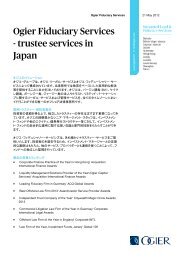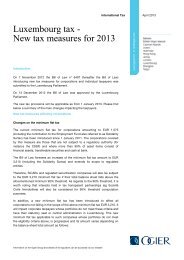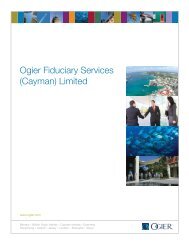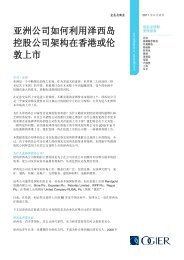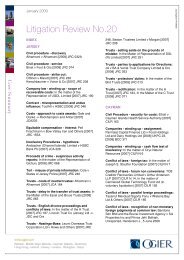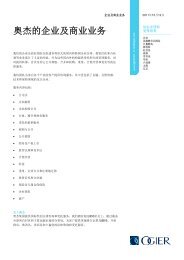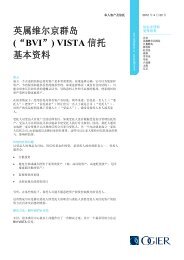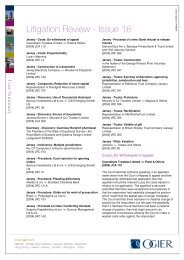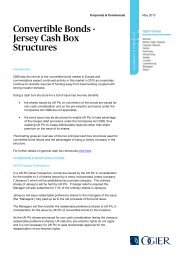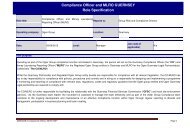Litigation Review - No. 19 - Ogier
Litigation Review - No. 19 - Ogier
Litigation Review - No. 19 - Ogier
Create successful ePaper yourself
Turn your PDF publications into a flip-book with our unique Google optimized e-Paper software.
April 2008<strong>Litigation</strong> <strong>Review</strong> - <strong>No</strong>. <strong>19</strong>Case Summarynevertheless auctioned one of the ships and the GrandCourt held that it was in contempt and ordered securityfor costs in the amount of $500,000.On appeal, the Court of Appeal held that the initialinjunction had been made in excess of the Grand Court’sjurisdiction as the State of Immunity Act precluded it frompreventing an agency or a foreign government fromcarrying out its governmental duties in its own state.TMSF sought the discharge of the Order and security forcosts on the basis that there had been a material changein circumstances in that the Court of Appeal had decidedthat the Grand Court had no jurisdiction to order theInjunction against TMSF also on the basis that security ofcosts was not usually granted against an agency or aforeign government of international good standing. It wasalso argued that as the breach of the Injunction only tookplace after TMSF had consulted with the Turkish Courtsfor guidance. It was not appropriate to make the orderagainst it.The Court held that the order for security for costs shouldbe discharged as TMSF had been put in a position inwhich it had no choice but to disobey either the CaymanCourts or the Turkish Courts and neglect its governmentalduties. The contempt aside therefore, TMSF should betreated like any other state agency with a goodinternational standing. Funds were available though theTurkish government and therefore no security would beordered. The re-assessment of the security for costsOrder was possible because, although there had been nomaterial change of circumstances in the sense that TMSFstill had no funds in the jurisdiction and had acted incontempt, the Court of Appeal’s decision meant that theInjunction ought not to have been made against TMSF inthe first place. It would be artificial to separate thewrongful making of the Injunction from TMSF’sdisobedience to that Injunction.Trusts: appointment and removal of trustprotectorIn the Matter of the Circle Trust - HSBCInternational Trustee Limited v. Wong &Others [2006 CILR 323]exercised in good faith for the benefit of the trust and allbeneficiaries. The Court was satisfied that: (a) thesettlor’s intent was that the protector was to assume afiduciary role; (b) the right of nomination accorded to thebeneficiaries imposes a fiduciary obligation upon them;and, (c) the answer to the second question was therefore“yes” - the exercise of the power to appoint a protector bya majority of the beneficiaries would be invalid if taintedby (i) irrationality, (ii) absence of good faith, or (iii)impropriety of the majority’s purpose.The Court also held that it has an inherent jurisdiction toremove the protector upon good cause being shown, andto appoint another in his stead.Trusts: forfeiture clausesA.N. v. Barclays Private Bank and Trust(Cayman) Limited & Others [2006 CILR 367]The Plaintiff, a primary discretionary beneficiary of the HIJTrust and the KLM Trust, applied for, inter alia,declarations that clauses 23 of the trusts were invalid andfor the removal of the incumbent trustees. Clause 23 ofeach trust was a forfeiture clause which stated thatbeneficiaries contesting the validity of the trust or thedecisions of the trustee would be “excluded from anybenefits, direct or indirect, deriving from the trust fund.”As a preliminary issue the Court was asked to determinewhether the forfeiture clauses had already operated bydint of the beneficiary’s contest in the proceedings,thereby excluding her from benefit under the trusts.Held: It would be unconscionable for a beneficiary toforfeit her interests simply by challenging any action ofthe trustee, even when he acted capriciously or in badfaith, and a clause purporting to have that effect would becontrary to public policy as an ouster of the jurisdiction ofthe Courts. Accordingly, clause 23 was to be interpretedas reading “whosoever unjustifiably contests the validityof this deed and the trust created under it…” and that forthe purposes of the clause, a justifiable contest would beone which was made bona fide, with probabilis causalitigandi and which was not frivolous or vexatious.The Plaintiff (the trustee of the Circle Trust) applied to theCourt for the preliminary determination of a number ofquestions regarding the beneficiaries’ power to appoint atrust protector. The second of these questions was“would the exercise of the power to appoint a protector bya majority of the beneficiaries be invalid if tainted by (i)irrationality, (ii) absence of good faith, or (iii) improprietyof the majority’s purpose?”.Held: The law requires the power to remove and appointtrustees, even when exercised by beneficiaries, to beexercised in good faith for the benefit of the trust as awhole. In this case, as the protector was afforded thepower to appoint and remove trustees, it followed that theright of nomination of the protector must equally beADMIN-14369297-2



